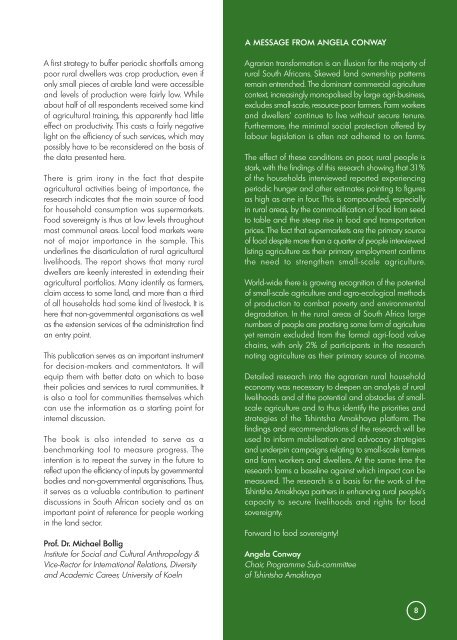THE AGRARIAN RURAL HOUSEHOLD ECONOMY
THE AGRARIAN RURAL HOUSEHOLD ECONOMY
THE AGRARIAN RURAL HOUSEHOLD ECONOMY
Create successful ePaper yourself
Turn your PDF publications into a flip-book with our unique Google optimized e-Paper software.
A first strategy to buffer periodic shortfalls among<br />
poor rural dwellers was crop production, even if<br />
only small pieces of arable land were accessible<br />
and levels of production were fairly low. While<br />
about half of all respondents received some kind<br />
of agricultural training, this apparently had little<br />
effect on productivity. This casts a fairly negative<br />
light on the efficiency of such services, which may<br />
possibly have to be reconsidered on the basis of<br />
the data presented here.<br />
There is grim irony in the fact that despite<br />
agricultural activities being of importance, the<br />
research indicates that the main source of food<br />
for household consumption was supermarkets.<br />
Food sovereignty is thus at low levels throughout<br />
most communal areas. Local food markets were<br />
not of major importance in the sample. This<br />
underlines the disarticulation of rural agricultural<br />
livelihoods. The report shows that many rural<br />
dwellers are keenly interested in extending their<br />
agricultural portfolios. Many identify as farmers,<br />
claim access to some land, and more than a third<br />
of all households had some kind of livestock. It is<br />
here that non-governmental organisations as well<br />
as the extension services of the administration find<br />
an entry point.<br />
This publication serves as an important instrument<br />
for decision-makers and commentators. It will<br />
equip them with better data on which to base<br />
their policies and services to rural communities. It<br />
is also a tool for communities themselves which<br />
can use the information as a starting point for<br />
internal discussion.<br />
The book is also intended to serve as a<br />
benchmarking tool to measure progress. The<br />
intention is to repeat the survey in the future to<br />
reflect upon the efficiency of inputs by governmental<br />
bodies and non-governmental organisations. Thus,<br />
it serves as a valuable contribution to pertinent<br />
discussions in South African society and as an<br />
important point of reference for people working<br />
in the land sector.<br />
Prof. Dr. Michael Bollig<br />
Institute for Social and Cultural Anthropology &<br />
Vice-Rector for International Relations, Diversity<br />
and Academic Career, University of Koeln<br />
A MESSAGE FROM ANGELA CONWAY<br />
Agrarian transformation is an illusion for the majority of<br />
rural South Africans. Skewed land ownership patterns<br />
remain entrenched. The dominant commercial agriculture<br />
context, increasingly monopolised by large agri-business,<br />
excludes small-scale, resource-poor farmers. Farm workers<br />
and dwellers’ continue to live without secure tenure.<br />
Furthermore, the minimal social protection offered by<br />
labour legislation is often not adhered to on farms.<br />
The effect of these conditions on poor, rural people is<br />
stark, with the findings of this research showing that 31%<br />
of the households interviewed reported experiencing<br />
periodic hunger and other estimates pointing to figures<br />
as high as one in four. This is compounded, especially<br />
in rural areas, by the commodification of food from seed<br />
to table and the steep rise in food and transportation<br />
prices. The fact that supermarkets are the primary source<br />
of food despite more than a quarter of people interviewed<br />
listing agriculture as their primary employment confirms<br />
the need to strengthen small-scale agriculture.<br />
World-wide there is growing recognition of the potential<br />
of small-scale agriculture and agro-ecological methods<br />
of production to combat poverty and environmental<br />
degradation. In the rural areas of South Africa large<br />
numbers of people are practising some form of agriculture<br />
yet remain excluded from the formal agri-food value<br />
chains, with only 2% of participants in the research<br />
noting agriculture as their primary source of income.<br />
Detailed research into the agrarian rural household<br />
economy was necessary to deepen an analysis of rural<br />
livelihoods and of the potential and obstacles of smallscale<br />
agriculture and to thus identify the priorities and<br />
strategies of the Tshintsha Amakhaya platform. The<br />
findings and recommendations of the research will be<br />
used to inform mobilisation and advocacy strategies<br />
and underpin campaigns relating to small-scale farmers<br />
and farm workers and dwellers. At the same time the<br />
research forms a baseline against which impact can be<br />
measured. The research is a basis for the work of the<br />
Tshintsha Amakhaya partners in enhancing rural people’s<br />
capacity to secure livelihoods and rights for food<br />
sovereignty.<br />
Forward to food sovereignty!<br />
Angela Conway<br />
Chair, Programme Sub-committee<br />
of Tshintsha Amakhaya<br />
8


